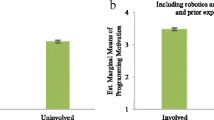Abstract
Botball is a middle and high school robotics education program with a focus on coding and software development skills along with the application of the engineering design process. Botball is used in hundreds of schools throughout the world. This paper discusses some of the differences and similarities of student teams based on their culture, robotics and software experience, gender and time on task. Some of these factors correlate to student interest in STEM careers while other correlate to the performance of the team.
Access this chapter
Tax calculation will be finalised at checkout
Purchases are for personal use only
Preview
Unable to display preview. Download preview PDF.
Similar content being viewed by others
References
Friedman, T.L.: The World is Flat: A Brief History of the Twenty-first Century. Farrar, Straus and Giroux (2005)
Lang, J.D., Cruse, S., McVey, F.D., McMasters, J.: Industry expectations of new engineers: A survey to assist curriculum designers. Journal of Engineering Education 88(1), 43–51 (1999)
Sullivan, J.F.: A call for k-16 engineering education. The Bridge, Linking Engineering and Society 36(2) (2006)
Snyder, T.D., Dillow, S.A.: Digest of education statistics 2011. National Center for Education Statistics (2012)
Ginder, S., Mason, M.: Postsecondary awards in science, technology, engineering, and mathematics, by state: 2001 and 2009. web tables. nces 2011-226. National Center for Education Statistics (2011)
Ramirez, F.O., Wotipka, C.M.: Slowly but surely? the global expansion of women’s participation in science and engineering fields of study, 1972-92. Sociology of Education, 231–251 (2001)
Hill, C., Corbett, C., St Rose, A.: Why So Few? Women in Science, Technology, Engineering, and Mathematics. ERIC (2010)
Dobson, I.R.: It’sa man’s world: the academic staff gender disparity in engineering in 21st century australia. Global Journal of Engineering Education 14(3), 213–218 (2012)
Roy, R.: Thinking comparative engineering education: India and the rest. Issues and Ideas in Education (March 2013)
Barker, B.S., Ansorge, J.: Robotics as means to increase achievement scores in an informal learning environment. Journal of Research on Technology In Education 39(3), 229–243 (2007)
Whitehead, S.H.: Relationship of Robotic Implementation on Changes in Middle School Students’ Beliefs and Interest toward Science, Technology, Engineering and Mathematics. PhD thesis, Indiana University of Pennsylvania (December 2010)
Stein, C., Nickerson, K.: Botball robotics and gender differences in middle school teams. In: Proceedings of ASEE Annual Conference, Salt Lake City, UT (June 2004)
Hartmann, S., Wiesner, H., Wiesner-Steiner, A.: Robotics and gender: The use of robotics for the empowerment of girls in the classroom. Gender Designs IT: Construction and Deconstruction of Information Society Technology 13, 175–188 (2007)
KIPR: Botball robotics education, http://www.botball.org (2009)
KIPR: Global conference on educational robotics (2013), http://kipr.org/gcer
Miller, D.P.: Robot contests at GCER 2011. IEEE Robotics and Automation Magazine 18(4), 10–12 (2011)
Eguchi, A., Hughes, N., Stocker, M., Shen, J., Chikuma, N.: RoboCupJunior – A decade later. In: Röfer, T., Mayer, N.M., Savage, J., Saranlı, U. (eds.) RoboCup 2011. LNCS, vol. 7416, pp. 63–77. Springer, Heidelberg (2012)
Sklar, E., Eguchi, A.: RoboCupJunior — four years later. In: Nardi, D., Riedmiller, M., Sammut, C., Santos-Victor, J. (eds.) RoboCup 2004. LNCS (LNAI), vol. 3276, pp. 172–183. Springer, Heidelberg (2005)
Miller, D.P., Stein, C.: So that’s what pi is for!” and other educational epiphanies from hands-on robotics. In: Druin, A., Hendler, J. (eds.) Robots for Kids: Exploring New Technologies for Learning, pp. 219–243. Morgan Kaufman (2000)
Beijing Yuying Secondary School: IMF-Botball 2014 trailer (2014), http://bit.ly/1wX8PKq
Author information
Authors and Affiliations
Corresponding author
Editor information
Editors and Affiliations
Rights and permissions
Copyright information
© 2015 Springer International Publishing Switzerland
About this paper
Cite this paper
Miller, D.P., Goodgame, S., Koppensteiner, G., Yong, M. (2015). Some Effects of Culture, Gender and Time on Task of Student Teams Participating in the Botball Educational Robotics Program. In: Kim, JH., Yang, W., Jo, J., Sincak, P., Myung, H. (eds) Robot Intelligence Technology and Applications 3. Advances in Intelligent Systems and Computing, vol 345. Springer, Cham. https://doi.org/10.1007/978-3-319-16841-8_49
Download citation
DOI: https://doi.org/10.1007/978-3-319-16841-8_49
Publisher Name: Springer, Cham
Print ISBN: 978-3-319-16840-1
Online ISBN: 978-3-319-16841-8
eBook Packages: EngineeringEngineering (R0)




